|
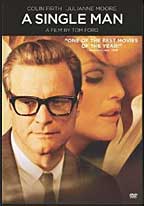
A
Single Man
Sony
Pictures,
2009
Director
Tom Ford
Screenplay:
Tom Ford,
David Scearce
From The Novel By Christopher Isherwood
Starring:
Colin Firth,
Julianne Moore,
Matthew Goode,
Nicholas Hoult
Jon Kortajarena,
Paulette Lamori,
Ryan Simpkins
Rated
R, 104 minutes
|
A
Day In The Life
by
Michael D. Klemm
Posted online August, 2010
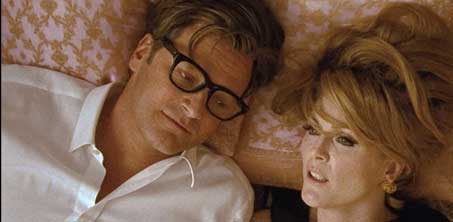
A
Single Man
(2009) chronicles a day in the life of George Falconer, a middle aged
college professor who has lost his taste for life. This most anticipated
film comes with outstanding credentials and it doesn't get any better
than this. It is based on the acclaimed 1964 novel by renowned gay author
Christopher Isherwood.
It is the debut film from designer Tom Ford, and it boasts a bravura performance
by Colin Firth (Another
Country and Apartment
Zero) in the lead role.
|
|
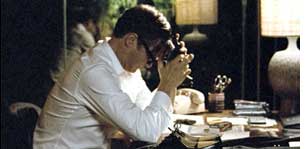 The
year is 1962. George is an unhappy man, going though the motions. We meet
him as he is attending to his morning toilet with great fastidiousness.
"It takes time in the morning for me to become George," he tells the audience,
"time to adjust to what is expected of George and how he is to behave.
By the time I have dressed and put the final layer of polish on the now
slightly stiff but quite perfect George I know fully what part I'm supposed
to play." Ritual, no doubt, has become comfort. George is mourning the
loss of his longtime partner, Jim. His beloved died in a car crash. Though
eight months have passed, it still hasn't been long enough for George
to be able to move on. In fact, George has decided that he is going to
kill himself at the end of the day. The
year is 1962. George is an unhappy man, going though the motions. We meet
him as he is attending to his morning toilet with great fastidiousness.
"It takes time in the morning for me to become George," he tells the audience,
"time to adjust to what is expected of George and how he is to behave.
By the time I have dressed and put the final layer of polish on the now
slightly stiff but quite perfect George I know fully what part I'm supposed
to play." Ritual, no doubt, has become comfort. George is mourning the
loss of his longtime partner, Jim. His beloved died in a car crash. Though
eight months have passed, it still hasn't been long enough for George
to be able to move on. In fact, George has decided that he is going to
kill himself at the end of the day.
|
|
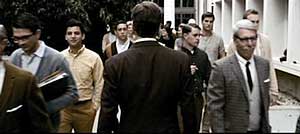 He
spends the afternoon attending to his affairs and "saying good-bye" to
people by being uncharacteristically nice to everyone. He abandons his
classroom lecture on Aldous Huxely and tries to impart a last bit of wisdom
down to his students. He shares a cigarette with a handsome Spanish hustler
and gives in to a flirtatious student. Ironically he lives more in these
few hours than he has in the past year. He
spends the afternoon attending to his affairs and "saying good-bye" to
people by being uncharacteristically nice to everyone. He abandons his
classroom lecture on Aldous Huxely and tries to impart a last bit of wisdom
down to his students. He shares a cigarette with a handsome Spanish hustler
and gives in to a flirtatious student. Ironically he lives more in these
few hours than he has in the past year.
|
|
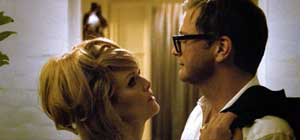 George
appears to be a loner without many friends. His closest confidante is
Charly (Julianne Moore), a fellow British expatriate. When Jim died, he
ran to her for solace. Charly is clearly in love with George. At some
point in the distant past, George slept with her and attempted a relationship.
George wisely resisted her attempts to marry and this is a good thing
because they would have probably turned into the stars of Who's Afraid
Of Virginia Woolf? if they had. Even so, they bicker like a longtime
married couple and probably know more about what makes each other tick
than anyone else. Charly still entertains the delusion that she and George
might someday be man and wife and dolls herself up for his impending visit
that evening. George
appears to be a loner without many friends. His closest confidante is
Charly (Julianne Moore), a fellow British expatriate. When Jim died, he
ran to her for solace. Charly is clearly in love with George. At some
point in the distant past, George slept with her and attempted a relationship.
George wisely resisted her attempts to marry and this is a good thing
because they would have probably turned into the stars of Who's Afraid
Of Virginia Woolf? if they had. Even so, they bicker like a longtime
married couple and probably know more about what makes each other tick
than anyone else. Charly still entertains the delusion that she and George
might someday be man and wife and dolls herself up for his impending visit
that evening.
|
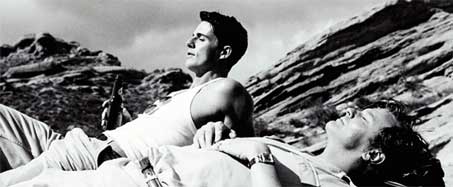 |
|
We learn
about George's relationship with Jim through a series of exquisitely realized
flashbacks. George's memories are idyllic and the flashbacks reflect this.
A black and white reverie, filmed outdoors on a rocky beach, is reminiscent
of period physique photography. The best is saved for a sequence, steeped
in domestic bliss, in which George and Jim recline facing on opposite
ends of the couch, reading and playfully bickering over who is going to
get up and change the record. George is reading Kafka (Metamorphosis)
while Jim reads Capote (Breakfast At Tiffany's). These small details
are woven into a wonderful tapestry that pulls the viewer into the film.
|
|
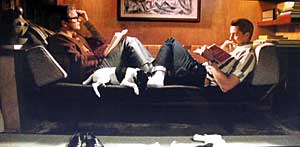 As
was the case with Isherwood's novel, George's homosexuality is presented
without fanfare or apology. (This actually shocked many of the era's literary
critics.) Despite being set in the early 60s, this is not a story about
the closet. Like the book, we are inside George's mind and the film flows
seamlessly between both his exterior and interior states. Liberties have
been taken without betraying the source material. George didn't plan to
kill himself in the book but this masterstroke by director Ford is a terrific
hook that anchors the film. As
was the case with Isherwood's novel, George's homosexuality is presented
without fanfare or apology. (This actually shocked many of the era's literary
critics.) Despite being set in the early 60s, this is not a story about
the closet. Like the book, we are inside George's mind and the film flows
seamlessly between both his exterior and interior states. Liberties have
been taken without betraying the source material. George didn't plan to
kill himself in the book but this masterstroke by director Ford is a terrific
hook that anchors the film.
|
|
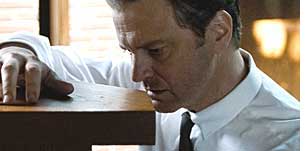 Death
hangs over much of the proceedings. For starters, Jim is always foremost
in George's thoughts. The way that George steadies himself and clutches
his chest during an early scene suggests a heart condition. George's dreams,
both asleep and awake, feature a nude man drifting and tumbling underwater,
presumably drowning. Television and radio broadcasts deliver a play by
play of the unfolding Cuban missile crisis and a fellow colleague bores
George with details about his backyard bomb shelter. (George's lack of
interest is apparent as he gazes instead at a group of shirtless men playing
tennis.) Death
hangs over much of the proceedings. For starters, Jim is always foremost
in George's thoughts. The way that George steadies himself and clutches
his chest during an early scene suggests a heart condition. George's dreams,
both asleep and awake, feature a nude man drifting and tumbling underwater,
presumably drowning. Television and radio broadcasts deliver a play by
play of the unfolding Cuban missile crisis and a fellow colleague bores
George with details about his backyard bomb shelter. (George's lack of
interest is apparent as he gazes instead at a group of shirtless men playing
tennis.)
|
|
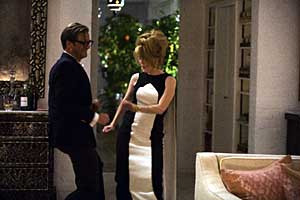 Despite
how this sounds, A Single Man
is not a 100 minute downer. Ford wisely injects much humor to keep things
from getting maudlin. During a typical moment, George washes down a small
tin of aspirins with a bottle of booze. An extended scene in which he
"practices" shooting himself is priceless, especially when he crawls into
a sleeping bag - presumably so that his blood won't stain the sheets.
Beforehand, he makes sure everything is in order and artfully arranges
all his paperwork (wills, deeds, suicide notes) across a desk. This "collage"
includes the clothes he is to be buried in - complete with instructions
to fasten his tie with a Windsor knot. This is anal retentiveness as an
artform, making it all the more funny when George does a drunken 60s go-go
dance with Charly to "Green Onion" by Booker T and the MGs. Despite
how this sounds, A Single Man
is not a 100 minute downer. Ford wisely injects much humor to keep things
from getting maudlin. During a typical moment, George washes down a small
tin of aspirins with a bottle of booze. An extended scene in which he
"practices" shooting himself is priceless, especially when he crawls into
a sleeping bag - presumably so that his blood won't stain the sheets.
Beforehand, he makes sure everything is in order and artfully arranges
all his paperwork (wills, deeds, suicide notes) across a desk. This "collage"
includes the clothes he is to be buried in - complete with instructions
to fasten his tie with a Windsor knot. This is anal retentiveness as an
artform, making it all the more funny when George does a drunken 60s go-go
dance with Charly to "Green Onion" by Booker T and the MGs.
|
|
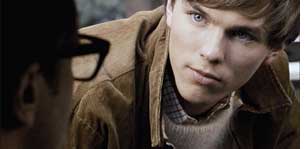 For
many, the dinner scene between George and Charly will be the film's highlight.
It is the classic gay man and fag hag relationship on acid. Or, in this
case, lots of gin. Charly's attempts at seduction couldn't be more obvious
if she held up a sign. They get drunk and rehash what could have been.
They fight, they make up. Her apology for angering George by suggesting
that his relationship with Jim wasn't "real" is truly sad because she
never experienced anything as "real" in her own life. There is also a
touching friendship that grows between George and an inquisitive pupil
(Nicholas Hoult). The student, Kenny, is a borderline stalker who keeps
running into George throughout the day. He is eventually revealed to be
gay and appears eager to learn from his teacher. He invites George on
an impulsive swim and then finally goes home with him. During their discussion,
George is amused to discover that Kenny has a Charly of his own. For
many, the dinner scene between George and Charly will be the film's highlight.
It is the classic gay man and fag hag relationship on acid. Or, in this
case, lots of gin. Charly's attempts at seduction couldn't be more obvious
if she held up a sign. They get drunk and rehash what could have been.
They fight, they make up. Her apology for angering George by suggesting
that his relationship with Jim wasn't "real" is truly sad because she
never experienced anything as "real" in her own life. There is also a
touching friendship that grows between George and an inquisitive pupil
(Nicholas Hoult). The student, Kenny, is a borderline stalker who keeps
running into George throughout the day. He is eventually revealed to be
gay and appears eager to learn from his teacher. He invites George on
an impulsive swim and then finally goes home with him. During their discussion,
George is amused to discover that Kenny has a Charly of his own.
|
|
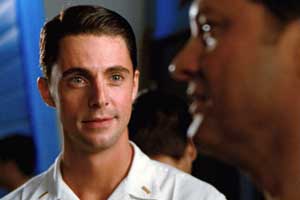 Colin
Firth is superb as George. His is a performance for the ages, brimming
with subtlety and nuance. Firth instinctively knows when to hold back
and when to open the floodgates. During the flashback when he receives
the news of Jim's death, you have never seen such grief and anguish on
the screen. Julianne Moore is also terrific. She is deliciously over the
top without becoming a caricature. Watching her drunkenly throw herself
at George is pathetic while still being funny. She is a Fassbinder
heroine with a British accent. Colin
Firth is superb as George. His is a performance for the ages, brimming
with subtlety and nuance. Firth instinctively knows when to hold back
and when to open the floodgates. During the flashback when he receives
the news of Jim's death, you have never seen such grief and anguish on
the screen. Julianne Moore is also terrific. She is deliciously over the
top without becoming a caricature. Watching her drunkenly throw herself
at George is pathetic while still being funny. She is a Fassbinder
heroine with a British accent.
|
|
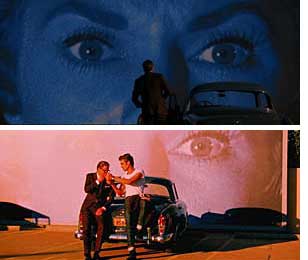 Ford's
background as a designer is evident throughout the film's impeccable art
direction. A Single Man looks
terrific. Considering Ford's fashion roots, it is not surprising that
he would have an eye for the perfect image. Perhaps some things look a
bit too perfect but the widescreen cinemascope evokes the style
of the period. The sets are a mix of Douglas Sirk and 50s sitcom. The
photography is unique; it is often washed out and then becomes oversaturated
with warm hues whenever George reacts favorably to something or becomes
sexually aroused. The same is true when a scene segues into flashback.
There is more than one nod to Hitchcock
- George flirts with the hustler under a huge billboard for Psycho,
and the lush score is reminiscent of Bernard Hermann's music for Vertigo.
The film is a virtual feast for refined senses. Ford's
background as a designer is evident throughout the film's impeccable art
direction. A Single Man looks
terrific. Considering Ford's fashion roots, it is not surprising that
he would have an eye for the perfect image. Perhaps some things look a
bit too perfect but the widescreen cinemascope evokes the style
of the period. The sets are a mix of Douglas Sirk and 50s sitcom. The
photography is unique; it is often washed out and then becomes oversaturated
with warm hues whenever George reacts favorably to something or becomes
sexually aroused. The same is true when a scene segues into flashback.
There is more than one nod to Hitchcock
- George flirts with the hustler under a huge billboard for Psycho,
and the lush score is reminiscent of Bernard Hermann's music for Vertigo.
The film is a virtual feast for refined senses.
|
|
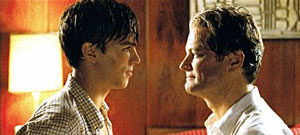 Isherwood
is best known as the author of the "Berlin Stories" which eventually became
the basis of both the stage and screen versions of Cabaret. These
tales were based on the years that he, and W.H. Auden, spent in pre-Nazi
Berlin, enjoying the "divine decadence." Despite outward appearances
of conformity and rectitude, Isherwood was a sexual outlaw who lived life
to its fullest. His much younger lover, artist Don Bachardy, recounts
in the 2008 documentary, Chris
and Don: A Love Story, how Isherwood originally wrote A
Single Man during the shakiest time of their marriage.
Isherwood thought his partner was going to leave him and writing the book
helped him deal with what he perceived to be an impending loss. As it
turned out, Isherwood would be luckier than George and lived with his
Jim until his death two decades later. In a nice homage to one of
the 20th century's most celebrated gay couples, the young college student
evokes old pictures of Bachardy when he first met Isherwood in the 50s.
It was these touches that made the film for me. Isherwood
is best known as the author of the "Berlin Stories" which eventually became
the basis of both the stage and screen versions of Cabaret. These
tales were based on the years that he, and W.H. Auden, spent in pre-Nazi
Berlin, enjoying the "divine decadence." Despite outward appearances
of conformity and rectitude, Isherwood was a sexual outlaw who lived life
to its fullest. His much younger lover, artist Don Bachardy, recounts
in the 2008 documentary, Chris
and Don: A Love Story, how Isherwood originally wrote A
Single Man during the shakiest time of their marriage.
Isherwood thought his partner was going to leave him and writing the book
helped him deal with what he perceived to be an impending loss. As it
turned out, Isherwood would be luckier than George and lived with his
Jim until his death two decades later. In a nice homage to one of
the 20th century's most celebrated gay couples, the young college student
evokes old pictures of Bachardy when he first met Isherwood in the 50s.
It was these touches that made the film for me.
I have
only one strike against the movie and that is the ending. Discussing it
would be too much of a spoiler but I saw no reason for Ford to change
the book's conclusion to something that is only suggested on the printed
page.
|
|
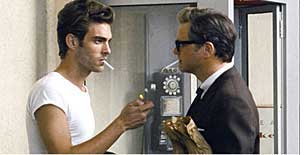 Ford's
cinematic vision for A Single Man
does justice to a great book. One would never think this is the work of
a first-time filmmaker, making Ford a director to watch. He puts enough
of his own stamp on the film to make it his own while also capturing many
of the details that made the book so memorable. George's opening voice-over,
for example, duplicates the novel's first sentence. It is always a pleasure
to see literature get filmed and to see it done well. Such films are a
very small subgenre of queer cinema; only Maurice
and Kiss
Of The Spider Woman spring immediately to mind. This is one of
the best films, gay or straight, that I've seen in a long time. Ford's
cinematic vision for A Single Man
does justice to a great book. One would never think this is the work of
a first-time filmmaker, making Ford a director to watch. He puts enough
of his own stamp on the film to make it his own while also capturing many
of the details that made the book so memorable. George's opening voice-over,
for example, duplicates the novel's first sentence. It is always a pleasure
to see literature get filmed and to see it done well. Such films are a
very small subgenre of queer cinema; only Maurice
and Kiss
Of The Spider Woman spring immediately to mind. This is one of
the best films, gay or straight, that I've seen in a long time.
Colin
Firth also appears in:
Another Country
Apartment Zero
More
On Christopher Isherwood:
Chris
& Don: A Love Story
Christopher and his Kind
|


